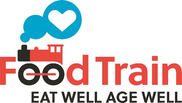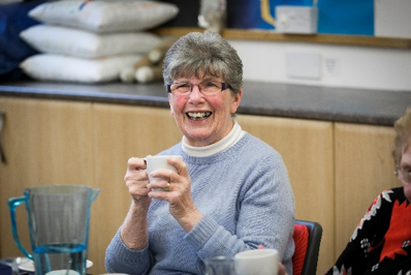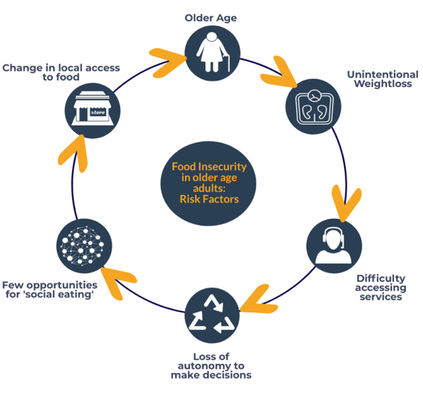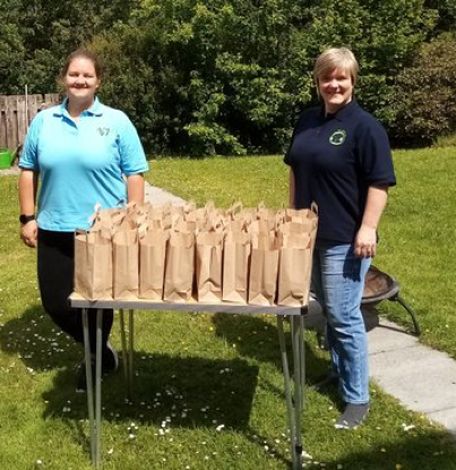|
Covid-19 hasn’t shown us anything new. Covid-19 has exaggerated existing fault-lines in an already strained system. Covid-19 has shown us why a structural and mindset change towards food must happen now, if we are to transform as a society and meet Scotland’s Public Health priorities. This blog will demonstrate why and how our food system must centralise the social and wellbeing value of food; particularly why we cannot think about the food system and physical access to food as stand-alone topics, but must recognise the wider values we all place in food and how this is connected to other issues, particularly health. Amongst older people there is clear evidence that the social dimensions of food, including the occurrence of social eating, has a direct connection to the preventable issues of malnutrition and social isolation. Right to Food Food is a fundamental human need and right. Our relationship with food is not static throughout our life course. However, the lockdown process has emphasised across generations and continents that the value we place in food is more than fuel and calories. For example, think about how your personal relationship with food has shifted over this lockdown period. Whether that be missing a birthday meal with friends, missing the social connection and conversation facilitation food enables, or being unable to go to the shops yourself due to shielding measures and being unable to have the freedom to make your own food decisions; which are key to feelings of self-worth. We must ensure the delivery of a ‘right to food’ into Scots Law, recognising the social importance of food, outlined by the Food and Agricultural Organisation (FAO, 2002, p2), “the right to adequate food shall therefore not be interpreted in a narrow or restrictive sense which equates it with a minimum package of calories, proteins or other specific nutrients”. To ensure that a right to food is delivered for all, the interconnections between food and other issues must be acknowledged.
The latest community-based data estimates 1 in 10 people in the UK over the age of 65 are malnourished or at risk of suffering from preventable malnutrition, which equates to 103,00 older people in Scotland, (National Records, 2018).Eat Well Age Well’s prevalence data gathering suggests this figure is in fact higher, with around 30% of vulnerable older people being at risk of malnutrition living in the community, in Scotland. Malnutrition is a serious health condition that occurs when a person’s diet does not meet their nutritional needs. Malnutrition is largely preventable, yet has a devastating impact on the physical health, wellbeing and quality of life of older adults-for more information, see here. It is unacceptable that a preventable condition is highly prevalent amongst plder people in Scotland. Eat Well Age Well advocates for recognition of the interaction between risk of malnutrition and social risk factors, such as loneliness and social isolation.
We have all experienced a reduction in social connection over this lockdown period, perhaps allowing us to better understand how being socially isolated makes an individual feel. Of a survey of 58 respondents who work directly with older people in partnership with Eat Well Age Well, 93% of respondents identified social isolation as the biggest challenge faced by older people in Scotland, this was prior to the Covid-19 pandemic. Now, as those shielding are advised to shield until the end of July, we cannot ignore the continued challenge social isolation poses to an individual’s health, both physically and mentally, in the short term, as well as the long-term challenge this poses to Scotland’s older population. Around half of shielding people are 65 or over. The blanket approach to delivery of food parcels to all shielding, does not recognise the complexities of food security in older age and its connections to these wider issues. Although physical access plays a part, as figure 1 demonstrates and the Food and Agricultural Association emphasise, being ‘food secure’ also includes the importance of autonomy and decision-making, the social and commensal value many associate and appreciate with food, amongst many other things. This social connection does not have to solely be achieved through eating together. For example, some of Eat Well Age Well’s Small Ideas Big Impact Funded grassroots projects have adapted to other ways of using food to facilitate social connection, during this time. Such as MS Argyll, who have adapted their service to delivery, with a focus on “keeping our older members of the community connected and eating well”.
Covid-19 and its impact should be a wake-up call. The term ‘build back better’ has been coined as a phrase in the recovery phase of Covid-19. We must centralise this approach and use this opportunity to reshape our future food system and not return to a normality, that includes unacceptable levels of food insecurity, social isolation and malnutrition, amongst older people. Centralising the social value of food and recognising it’s direct connection to social risk-factors and link to wider health priorities, is key, if we are to ‘build back better’ and create a Scotland that prioritises “ensuring people are healthy, happy and secure in older age” and in the process ensure the preventable issues of malnutrition and social isolation are not prolific to the ageing experience in Scotland. Moving forward, cross-sectoral reflection and ‘joined-up’ conversation, learning, and action is key. The Covid-19 response has emphasised how crucial community-based solutions are; and how grassroot investment can result in an effective, individualised response, that understands its community. If we are to deliver radical change that recognises that- food is a tool, food is a connector and food is social, community, grassroots approaches and the third sector must be at the heart of this. Let’s build back better and recognise the importance of the social value of food and how instrumental Scotland’s third sector are in prioritising this. Find out more about our work at our project websites and on Twitter
Eat Well Age Well @EatWellScot Food Train @FoodTrainScot Meal Makers @MealMakersScot For more information of Food Train’s response to Covid-19, see here. Eat Well Age Well, To feedback or if you would like more information, please get in touch with Tilly Robinson-Miles, Impact and Policy Officer, Eat Well Age Well Email: [email protected] Twitter: @TRobinsonMiles
1 Comment
|
Proudly powered by Weebly




